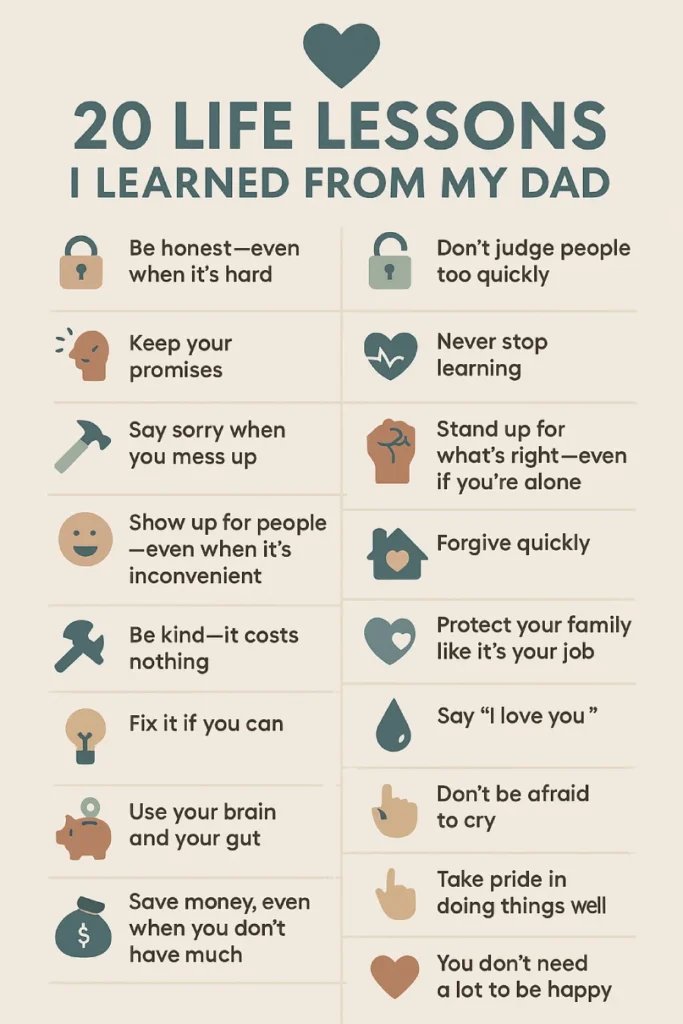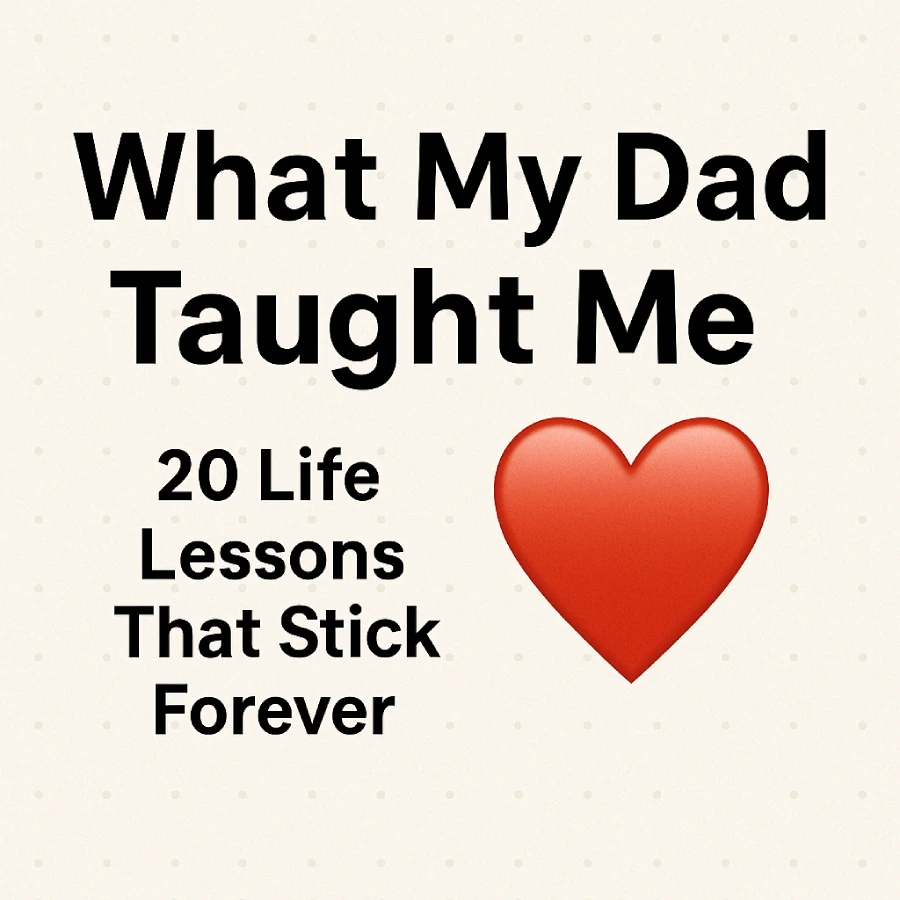What are the most important life lessons dads teach us?
From “always tell the truth” to “show up even when it’s hard,” fathers pass down powerful values that shape who we are. In this post, we’ll explore 20 timeless lessons—from real stories—that kids carry forever. These aren’t just words—they’re wisdom that sticks for life.

❤️ 1. “Be honest—even when it’s hard.”
“My dad once made me return a candy bar I took without paying. I was 9. I cried the whole way. But I learned that doing the right thing matters more than saving face.”
— Melissa, 28
This simple lesson shaped how Melissa handles friendships, jobs, and even how she treats herself. Dads who teach honesty give their kids a compass for life. Even when it’s uncomfortable or embarrassing, truth builds trust—and that’s something that lasts a lifetime.
2. “Keep your promises.”
“Dad told me, ‘If you say you’re going to do something, your word becomes your reputation.’”
— Jordan, 31
When you keep your promises, people know they can count on you. Whether it’s showing up on time or keeping a secret, trust is built one promise at a time. A dad who sticks to his word teaches you to do the same in school, work, and life.
3. “Say sorry when you mess up.”
“I broke his favorite watch and tried to hide it. He wasn’t mad I broke it. He was mad I didn’t tell the truth. When I said sorry, he hugged me and said, ‘Now that’s being a man.’”
— Eli, 20
Saying sorry isn’t weak—it’s a sign of strength. It shows you take responsibility and care about others. Dads who model forgiveness help kids grow into emotionally healthy adults.
4. “Work hard, then rest proud.”
“On weekends, Dad worked in the yard for hours. But when he sat down with iced tea and said, ‘That’s a good day’s work,’ I understood what pride really meant.”
— Sofia, 24
Effort matters. It doesn’t have to be perfect—as long as you gave your best. When dads show pride in hard work, kids learn to value effort over outcome.
5. “Show up for people—even when it’s inconvenient.”
“Dad missed his own birthday dinner to help a neighbor fix a flat tire. He said, ‘You don’t schedule kindness—you just do it.’”
— Leo, 33
Showing up is one of the biggest acts of love. When you’re tired, busy, or distracted—but still make time—that’s real care. Dads who show up teach you how to be dependable.
6. “Be kind. It costs nothing.”
“Even at the store, Dad greeted the cashier with a joke or kind word. He said, ‘Kindness takes seconds and lasts all day.’”
— Clara, 29
Being kind doesn’t require money or power—just heart. When dads lead with kindness, kids learn that small gestures leave a big impact.
7. “Fix it if you can. Try, even if you can’t.”
“Dad couldn’t fix my old bike, but he tried anyway—and we laughed the whole time. Trying mattered more than fixing.”
— Jake, 14
Life is full of broken things—bikes, toys, relationships. Dads who try to fix things teach persistence, not perfection.
8. “Use your brain and your gut.”
“I was about to make a big decision. Dad said, ‘Think it through—but listen to your gut too. Both are there for a reason.’”
— Naomi, 26
Logic and instinct can work together. Dads who encourage balanced thinking raise kids who make thoughtful and confident choices.
9. “Save money, even when you don’t have much.”
“He gave me a piggy bank and said, ‘If you can save $1, you can save $100 later.’”
— Brandon, 18
Saving is more about habit than amount. Dads who teach savings teach stability—and the confidence that you’ll be okay tomorrow.
10. “Laugh loud. Laugh often.”
“Dad danced in the kitchen. He laughed at his own jokes. He made life feel lighter just by laughing.”
— Hailey, 21
Laughter is healing. When dads laugh freely, they teach us not to take life too seriously—and that joy can live in every day.
11. “Always carry an extra charger—and kindness.”
“He kept a spare charger in his truck and a bag of granola bars in the glovebox. ‘Be prepared to help, even in little ways,’ he said.”
— Tom, 35
Helping others doesn’t have to be grand. Sometimes being prepared to offer a little support is the kindest thing. Dads like this teach you how to care, quietly but powerfully.
12. “Don’t judge people too quickly.”
“I was angry at a kid for being rude. Dad said, ‘Maybe his day’s been worse than yours. Give him some space.’”
— Jenny, 17
Empathy changes how we see the world. Dads who lead with compassion teach their children to slow down and see others with kinder eyes.
13. “Never stop learning.”
“Dad read books before bed—even after a long day of work. He said, ‘Smart people keep asking questions.’”
— Omar, 22
Curiosity is contagious. When dads make learning a lifelong habit, kids grow up valuing knowledge and self-growth.
14. “Stand up for what’s right—even if you’re alone.”
“He once corrected a friend for making a rude joke. ‘Right is right—even when it’s not popular,’ he told me later.”
— Maya, 30
It’s not always easy to speak up. But dads who do, show us that integrity matters—and sometimes, courage looks like standing alone.
15. “Forgive quickly. Life’s too short.”
“He’d argue with my uncle, but always ended with a hug. ‘Don’t let small things steal big relationships,’ he told me.”
— Casey, 25
Letting go of grudges is a form of love. Dads who forgive teach us to prioritize peace over pride.
16. “Protect your family like it’s your job—because it is.”
“Dad didn’t say much, but I always felt safe. He made sure we had food, light, and love—no matter what.”
— Rosie, 19
Protection isn’t just physical—it’s emotional too. Dads who protect quietly teach us how to care deeply and constantly.
17. “Say ‘I love you’ without being shy.”
“Every time I left the house, Dad would say, ‘Love you, kid.’ Now I say it back every chance I get.”
— Carlos, 27
Love isn’t something to hide. Dads who say it often and mean it teach their kids that feelings are meant to be shared.
18. “Don’t be afraid to cry. Just don’t stop there.”
“He cried at his dad’s funeral and told me, ‘Tears don’t make you weak—they make you real.’”
— Emily, 32
Dads who show emotions teach strength and softness go hand in hand. Feeling deeply is not weakness—it’s the root of connection.
19. “Take pride in doing things well—even the small stuff.”
“He folded towels like a hotel. ‘If you’re going to do something,’ he said, ‘do it well.’”
— Samir, 16
Whether it’s chores or a big job, pride in work builds self-respect. Dads who value excellence help kids develop high standards and a strong work ethic.
20. “You don’t need a lot to be happy—just enough love.”
“We didn’t have fancy vacations, but we had pancakes on Sundays, hugs every night, and love always.”
— Alyssa, 23
Joy isn’t in things—it’s in moments, people, and love. Dads who live simply but love deeply give the greatest gift of all: gratitude.
Conclusion
These lessons didn’t come from a book. They came from moments—washing the car, building a shelf, long talks on late nights.
What your dad teaches you doesn’t just help you grow up—it helps you grow strong.
📝 Now it’s your turn.
What’s one thing your dad taught you that you’ll never forget? Share it in the comments or post it online using the hashtag: #WhatMyDadTaughtMe
FAQ: Life Lessons from Fathers
1. What do you learn from your father?
We learn more from our fathers than we often realize. From teaching us how to ride a bike to showing us how to stay calm under pressure, dads influence how we think, love, and lead. Whether through words or actions, fathers teach us life skills like responsibility, discipline, humor, and the importance of showing up for others.
2. What did I learn from my father?
Every person’s answer is personal. Some might say they learned how to fix things, while others say they learned patience, humility, or strength. The most common answers involve learning how to treat others, handle failure, or stay steady during tough times. What you learn from your father becomes part of how you see the world.
3. What I learned from my dad quotes?
Here are a few heartfelt quotes inspired by fatherly wisdom:
“My dad didn’t tell me how to live. He lived—and let me watch.”
“When life got messy, Dad stayed calm. That’s how I learned what strength really is.”
“My father said few words, but every one of them counted.”
“What I learned from my dad wasn’t in books—it was in everyday life.”
These quotes can be used in cards, posts, or stories that honor your father’s legacy.
4. What does a daughter learn from her father?
A daughter often learns how she should be treated by others from her dad. He sets an example of love, respect, and protection. Daughters with present and supportive fathers grow up with stronger confidence, higher standards in relationships, and a clearer understanding of emotional safety. A dad’s presence teaches her she matters.
5. What do sons learn from their fathers?
Sons often mirror their fathers. Through watching how their dads work, love, and respond to stress, boys learn what it means to be a man. Fathers shape their sons’ ideas about strength, respect, responsibility, and resilience. Even in silence, a father teaches his son how to lead, love, and learn from mistakes.
6. What do men learn from their fathers?
Men often reflect their father’s character, especially when they become adults or fathers themselves. Whether it’s how to handle conflict, support a family, or maintain integrity, the lessons stay. Some men carry forward positive examples. Others, if their relationship was strained, learn what not to do. Both types of learning can shape a man’s legacy.
7. What does father teach us?
Fathers teach us how to face life. They show us how to be strong but gentle, firm but fair. They guide us through failures and celebrate our wins. A father’s teachings often focus on self-control, work ethic, loyalty, and protecting those you love. Even when unspoken, his actions teach volumes.
8. What your father did for you?
For many, fathers provided not just food or shelter, but emotional safety and moral grounding. They gave guidance, encouragement, life examples, and countless sacrifices behind the scenes. Your dad may have stayed up worrying, worked overtime, or taught you how to ride a bike—and those acts live forever in your heart, even if you didn’t notice them at the time.
9. What being a parent has taught me?
Becoming a parent often reveals hidden strengths and stretches your limits. It teaches patience, sacrifice, and the value of being present. Parents learn that love is not just a feeling—it’s a choice made every single day, even on the hard days. You learn to forgive faster, care deeper, and live with more purpose.
10. How does being a father change you?
Being a father changes your priorities instantly. Life becomes less about “me” and more about “them.” You begin to think long-term, lead by example, and discover a deeper kind of love. Many dads say becoming a father gave their life new meaning—and pushed them to become better versions of themselves.
11. What does fatherhood teach?
Fatherhood teaches humility, strength, empathy, and flexibility. It challenges a man to be more than a provider—to be emotionally available, consistent, and wise. It teaches how to balance protection with permission, discipline with grace. And above all, it shows that love isn’t loud—it’s often in the quiet moments.
12. What do your parents teach you?
Parents, as a team, teach us our first lessons in love, communication, and identity. They show us how to manage conflict, work for what we want, and support one another. Even when imperfect, the way they live teaches us how to show up in relationships, raise our own children, and treat others.
13. What is the importance of a father figure?
A father figure fills the space of protection, emotional support, and mentorship. This can be a biological dad, stepdad, uncle, grandfather, coach, or any man who steps in with love and guidance. Children with a strong father figure often grow up with more confidence, structure, and emotional balance.
14. What is the personality of a father figure?
A father figure is usually calm, dependable, wise, and firm yet loving. He may not always have the loudest voice, but he has the strongest presence. He guides by doing, corrects with care, and comforts with consistency. His personality leaves a lasting impression on a child’s view of safety and self-worth.
15. What does the Bible say about a father figure?
The Bible often presents fatherhood as a sacred responsibility. Proverbs 22:6 says, “Train up a child in the way he should go, and when he is old, he will not depart from it.” The Bible teaches that fathers should guide, protect, love, and discipline their children with patience and faithfulness, modeling God’s love.
16. What effect does lack of father figure have?
The absence of a father figure can affect emotional growth, self-esteem, and behavior. Children without strong father figures may struggle with trust, identity, or stability. However, many overcome this through mentorship, strong mothers, or chosen father figures who step in. The lack is real—but it doesn’t have to define you.
17. What genetic traits come from the father?
Genetically, fathers contribute half of a child’s DNA. Traits like eye color, height, or hair texture may come from Dad. Interestingly, the sex of the baby (boy or girl) is determined by the father’s chromosomes. Beyond biology, many emotional traits, mannerisms, and interests also reflect paternal influence through both nature and nurture.




